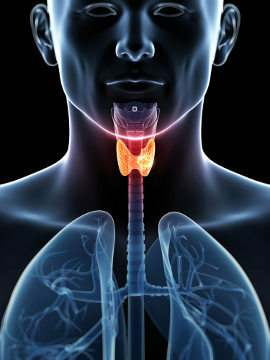O endocrine system It is formed by glands and tissues responsible for releasing substances known as hormones. These are released directly into the bloodstream and act on specific parts of the body. In these places, they interact with the tissue or organ, triggering a specific response.
You hormones produced by the endocrine systemare extremely important for the organism, being related, for example, to the growth of the body, sexual development, glucose control in the blood, among other functions.
Read too:Digestive system — the system responsible for nutrient absorption
What are glands?
The glands are andstructures responsible for secreting substances in our body. We can classify them into three types:
exocrine;
endocrine; and
mixed.
At exocrine glands are those that have ducts and produce secretions that are released on the surface of the body or inside cavities. These glands, like the sweating and the sebaceous, they are not part of the endocrine system. At endocrine glands they do not have ducts and release their secretions into the blood, which is responsible for transporting these secretions to the site of action. Substances secreted by the endocrine gland are called hormones. At
mixed glands, in turn, are those that have an endocrine and an exocrine portion.
What are hormones?
hormones are substances produced by the endocrine glands. They can be considered bodily regulators that act over long distances, as they circulate through the blood to the place where they play their role. Each hormone binds to specific receptors on our body, which means that, even if this substance circulates throughout the body, it acts only in its place of action. Hormones are usually released in very low concentrations. To learn more about these important substances, read: Hormones.
Major glands of the endocrine system
Below we list some of the endocrine glands present in our body and the main substances they produce.

Pineal gland: responsible for the synthesis of melatonin, a hormone that acts in the regulation of sleep.
Hypothalamus: produces different hormones that work by stimulating or inhibiting the secretion of hormones by the pituitary. In addition, it synthesizes two important hormones that are later stored in the pituitary: oxytocin and antidiuretic hormone (ADH). Oxytocin is related to the contraction of the uterus at the time of childbirth and the release of milk by the mammary glands, and ADH is related to the reabsorption of water in the kidneys.
Hypophysis: produces different hormones, such as growth hormone, prolactin, follicle-stimulating hormone and luteinizing hormone. Growth hormone is responsible for the body's growth and some metabolic functions. Prolactin is related to the production of milk by the mammary glands. Follicle-stimulating and luteinizing hormones act on the gonads (ovaries and testes).
Thyroid: produces thyroxine (T4) and triiodothyronine (T3), two hormones related to metabolism. The thyroid also produces calcitonin, which promotes the deposition of calcium in bones, lowering the concentration of calcium in the blood.
Parathyroid: it produces parathyroid hormone, a hormone that causes calcium levels in the blood to rise.
Adrenals: one of the main hormones produced by the adrenal is adrenaline, which is related to stressful situations. One of the actions of this hormone is to accelerate the heartbeat, a way to prepare the body for dangerous situations, promoting greater blood circulation.
Pancreas: is a mixed gland that produces two important hormones (a insulin and glucagon) and also pancreatic juice, which does not contain hormones. Insulin and glucagon control the amount of sugar in your blood and have opposite actions. Insulin works by lowering the blood glucose level, while glucagon works by increasing these levels.
Testicle: produces testosterone, a hormone that is linked to the appearance of secondary male sexual characteristics and acts in the production of sperm.
Ovary: it produces estrogen and progesterone, hormones that act on the menstrual cycle. Estrogen is also related to the development of female secondary sexual characters.
Read too: Noradrenaline - hormone linked to anxiety control and learning
The importance of the endocrine system
The endocrine system is the system responsible for ensuring the release of hormones in our body, which have the function of regulating the various processes that occur in the body. These substances are essential for the functioning of the body and development of the individual, acting from metabolism to our growth and reproduction. Together with nervous system, the endocrine system, therefore, acts in the regulation and control of the body's functions.



